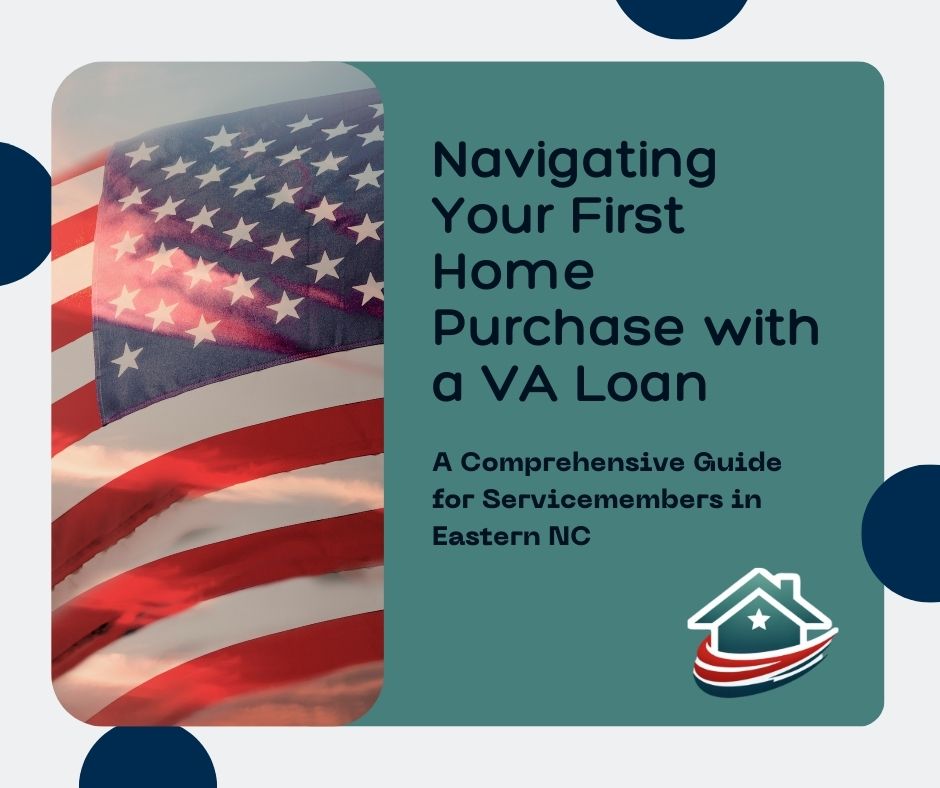For servicemembers stationed in Eastern NC, including Camp Lejeune, MCAS New River, and MCAS Cherry Point, buying your first home using a VA loan can be both an exciting and daunting process. This comprehensive guide, tailored to your unique needs, will walk you through each step of the journey, ensuring you make the most of your VA loan benefits.
Step 1: Understanding VA Loan Benefits
Before diving into the homebuying process, it’s crucial to understand the benefits of a VA loan. Key features include no down payment requirement, low interest rates, limited closing costs, and no need for Private Mortgage Insurance (PMI). Remember, this is a lifetime benefit you can use multiple times.
Step 2: Obtaining Your Certificate of Eligibility (COE)
Your Certificate of Eligibility (COE) is the first step in utilizing your VA loan. It proves to lenders that you’re eligible for VA loan benefits. You can apply for your COE online through the VA’s eBenefits portal or ask your lender to obtain it on your behalf.
Step 3: Determining Your Lifestyle Preferences
Consider the lifestyle you desire in your new home. Do you prefer a quiet neighborhood or proximity to base amenities? This step is crucial in narrowing down your search to homes that meet your specific needs.
Step 4: Making a List of Must-Haves and Nice-to-Haves
Create a list of features you need in a home (must-haves) and those you’d like to have (nice-to-haves). This could include the number of bedrooms, yard space, or proximity to schools.
Step 5: Finding a Real Estate Agent
Partner with a real estate agent who understands the VA loan process and the unique needs of military families, like me. They’ll be invaluable in guiding you through the homebuying journey.
Step 6: Choosing the Right Lender

Select a lender experienced in handling VA loans. They can help you understand your borrowing power and the specifics of VA loan financing. If you need some recommendations, ask your real estate agent.
Step 7: Searching for Homes
With your preferences and budget in mind, start searching for homes. Utilize online resources and your real estate agent’s expertise to find properties that align with your criteria.
Step 8: Going on Showings and Rating Each Home
Visit potential homes and rate them based on how well they meet your must-haves and nice-to-haves. This will help you keep track and make an informed decision.
Step 9: Putting in an Offer
Understanding the Offer Process
When you find a home you love, the next step is to put in an offer. This involves more than just deciding on a price; it includes understanding and navigating various components such as the due diligence fee, earnest money deposit, and the importance of a comparative market analysis.
Due Diligence Fee
The due diligence fee is a negotiated amount paid directly to the seller, which compensates them for taking the house off the market while you conduct your inspections and finalize your loan. This fee is typically non-refundable, but it shows the seller your serious commitment to the purchase.
Earnest Money Deposit
In addition to the due diligence fee, you’ll also make an earnest money deposit. This is a larger sum held in escrow as a sign of good faith. It demonstrates your intention to complete the purchase and is typically applied towards your down payment or closing costs at closing. If the deal falls through due to contingencies outlined in your contract, this deposit may be refundable.
Comparative Market Analysis (CMA)
Before making an offer, allow your real estate agent to conduct a Comparative Market Analysis (CMA). This analysis compares the property you’re interested in with similar properties in the area that have recently sold. A CMA helps you understand the local market and determine a fair and competitive offer price. It considers factors like the size of the home, its features, the neighborhood, and current market trends.
Making a Strong Offer
With the insights from the CMA, you can make a strong offer that is attractive to the seller yet fair to you. Your offer should also include any contingencies you require, such as the home passing inspection or appraisal. Your real estate agent will guide you through crafting an offer that balances your interests with market realities.
Negotiation and Flexibility
Be prepared for some negotiation. Sellers may counter your offer, and it’s important to remain flexible yet firm on your must-haves. Your agent will be instrumental in negotiating terms that work for both parties.
Finalizing the Offer
Once you and the seller agree on the terms, you’ll finalize the offer. This includes signing a purchase agreement that outlines the specifics of the deal, including the due diligence fee, earnest money deposit, sale price, and any contingencies.
Step 10: Navigating the Due Diligence Period
Understanding the Due Diligence Period
The due diligence period is a critical phase in the homebuying process, especially when using a VA loan. It typically begins immediately after your offer is accepted and lasts for a negotiated number of days. This time allows you to thoroughly evaluate the property and ensure it meets your standards and VA loan requirements.
Home Inspection
A comprehensive home inspection is essential. A qualified inspector will examine the property’s structure, systems, and overall condition. Key areas of focus include:
- Foundation and Structural Integrity: Checking for cracks, settling, or other signs of structural issues.
- Roof and Exterior: Assessing the condition of the roof, siding, gutters, and windows.
- Plumbing and Electrical Systems: Ensuring all plumbing and electrical systems are up to code and functioning correctly.
- Heating and Cooling Systems: Verifying the age, condition, and efficiency of HVAC systems.
- Interior Condition: Inspecting walls, ceilings, floors, and installed appliances for damage or wear.
- Potential Hazards: Identifying any presence of mold, asbestos, or lead-based paint (for homes built prior to 1978).
Additional Inspections and Considerations
Beyond the standard home inspection, consider these additional evaluations:
- Pest Inspection: Particularly in areas prone to termites or other pests, this inspection is crucial for uncovering any infestations or damage.
- Radon Testing: Radon is a naturally occurring, radioactive gas that can be harmful at high levels. Testing is the only way to know if radon is present.
- Water Testing: If the property uses a well, test the water for quality, including checking for bacteria, pH levels, and contaminants.
- Septic System Inspection: For homes with a septic system, ensure it’s in good working order and properly maintained.
Property Survey
A property survey is another important aspect to consider during due diligence. It delineates the property’s boundaries and can reveal any encroachments or easements that could affect your use of the land.
Appraisal
The VA requires an appraisal to determine the property’s value and ensure it meets minimum property requirements (MPRs). The appraisal assesses the home’s condition, features, and compares it to similar properties in the area.
Addressing Concerns
If any issues are uncovered during inspections or the appraisal, use this period to negotiate repairs or adjustments to the sale terms. This might include asking the seller to make repairs, seeking a price reduction, or even backing out of the deal if significant problems are found.
Finalizing Your Decision
The due diligence period is your opportunity to make an informed decision about the property. Work closely with your real estate agent, lender, and attorney to navigate this phase effectively. Once satisfied with the condition of the home and the terms of the sale, you can confidently move forward to closing.
Step 11: Selecting a Closing Attorney
In North Carolina, a closing attorney handles the legal aspects of your home purchase. Choose one experienced in VA loans and real estate transactions. If you need help with finding one in the area, ask your real estate agent for some recommendations.
Step 12: The Closing Process
Preparing for Closing
As you approach the closing date, there are several key steps to prepare for. This final phase involves finalizing your loan, signing a multitude of legal documents, and officially transferring ownership of the property to you.
Final Loan Approval
Before closing, your lender will finalize your loan approval. This may involve a final credit check and verification of employment to ensure your financial situation hasn’t changed since your initial application. Ensure all your financial documents are up-to-date and readily available.
Review Closing Disclosure
A few days before closing, you’ll receive a Closing Disclosure. This document details the final terms of your loan, including the interest rate, monthly payments, and closing costs. Review this document carefully and compare it to the initial Loan Estimate to ensure there are no surprises.
Walk-Through Inspection
Typically, a final walk-through of the property is conducted 24 hours before closing. This is your chance to ensure the home is in the agreed-upon condition and that any repairs stipulated in the contract have been completed.
Closing Day
On closing day, you’ll meet with your real estate agent, closing attorney, and possibly a representative from the lender. You’ll sign a series of documents, including:
- The Mortgage or Deed of Trust: This secures the loan on the property.
- The Promissory Note: Your agreement to repay the loan.
- Closing Disclosure: Confirming the details of your loan.
- Certificate of Occupancy: For new construction, this confirms the home is ready for occupancy.
Closing Costs
Be prepared to pay closing costs, which can include loan origination fees, appraisal fees, title insurance, and more. These costs can vary but typically range from 2% to 5% of the home’s purchase price.
Receiving the Keys
Once all the paperwork is signed and the closing costs are paid, you’ll receive the keys to your new home. The property is now officially yours.
Post-Closing
After closing, your lender will send your loan payments schedule. Keep all closing documents in a safe place for future reference. It’s also a good time to ensure your new home is properly insured and to set up utilities and other services.
Conclusion
Purchasing your first home using a VA loan in Eastern NC is a significant milestone. By following this roadmap, you’ll be well-equipped to navigate the process with confidence. Remember, as a servicemember, you have unique benefits at your disposal. Make the most of them and welcome to your new home!





